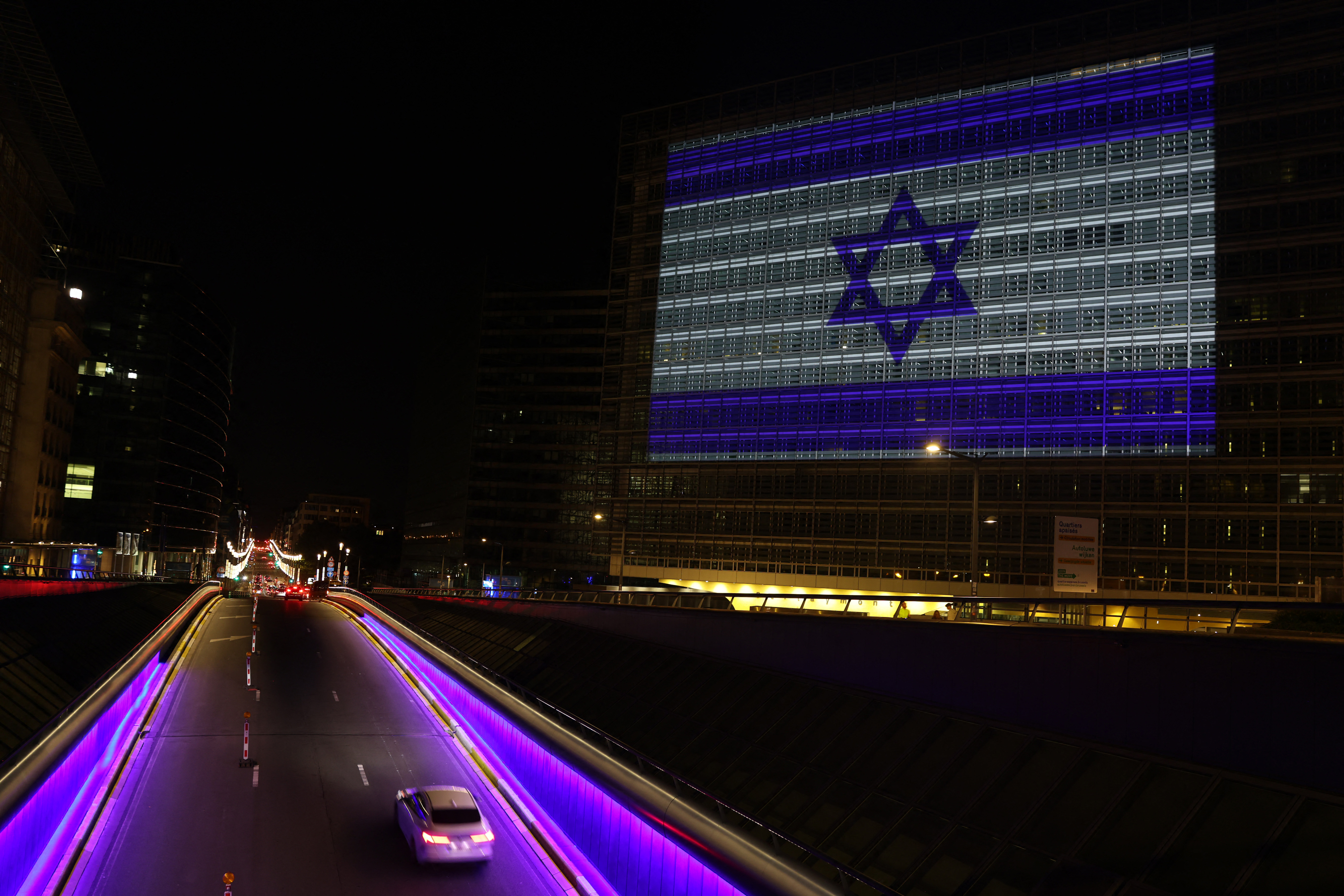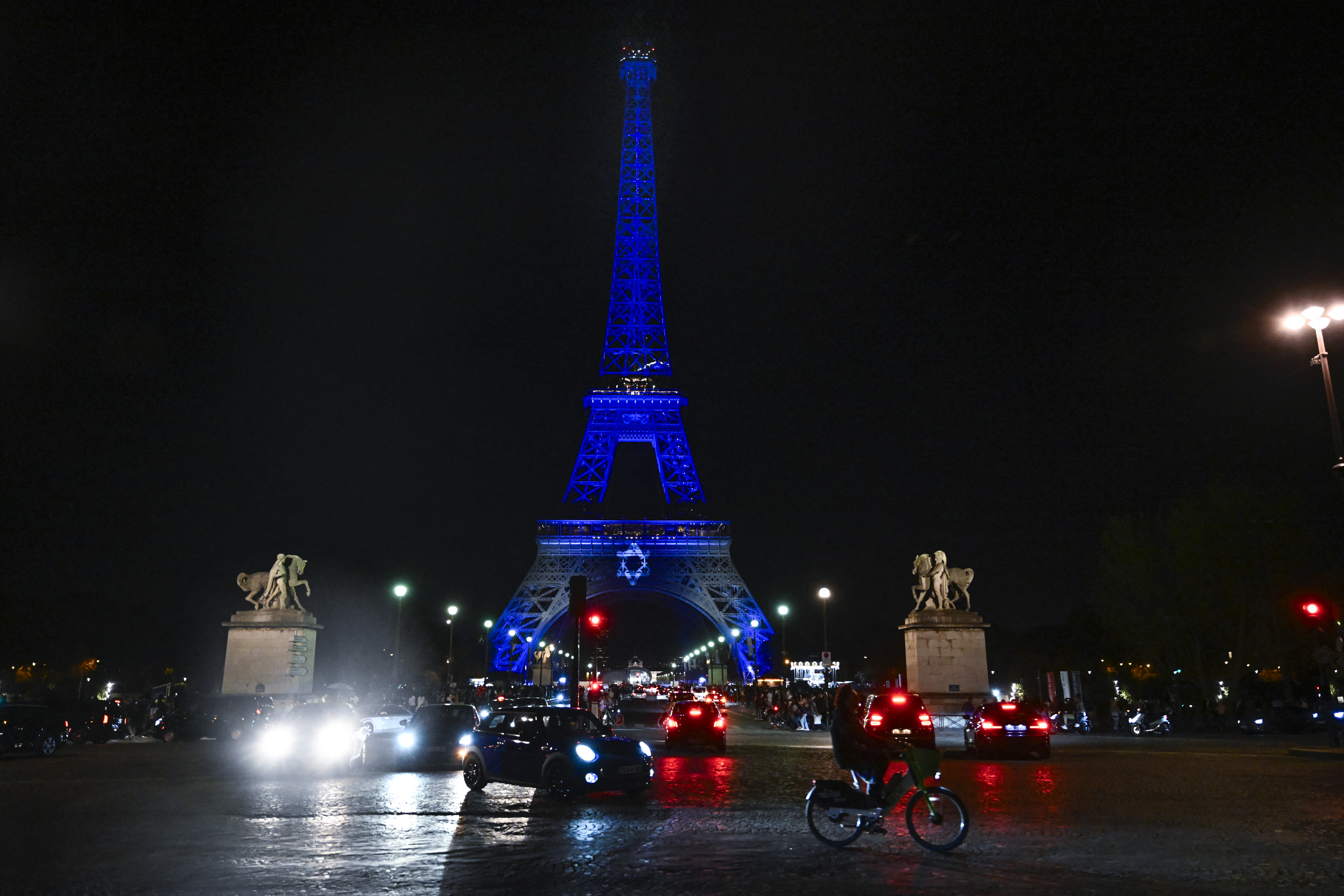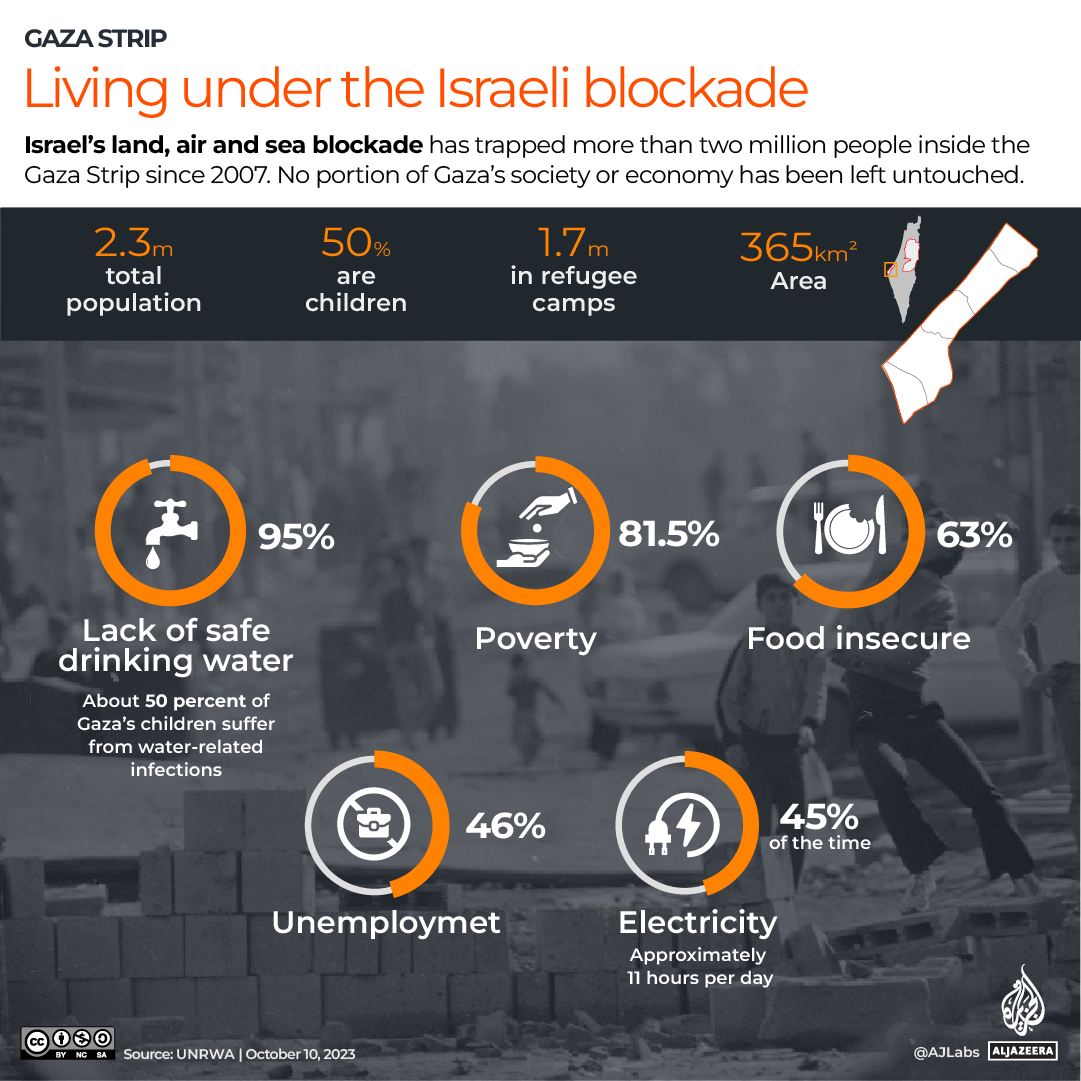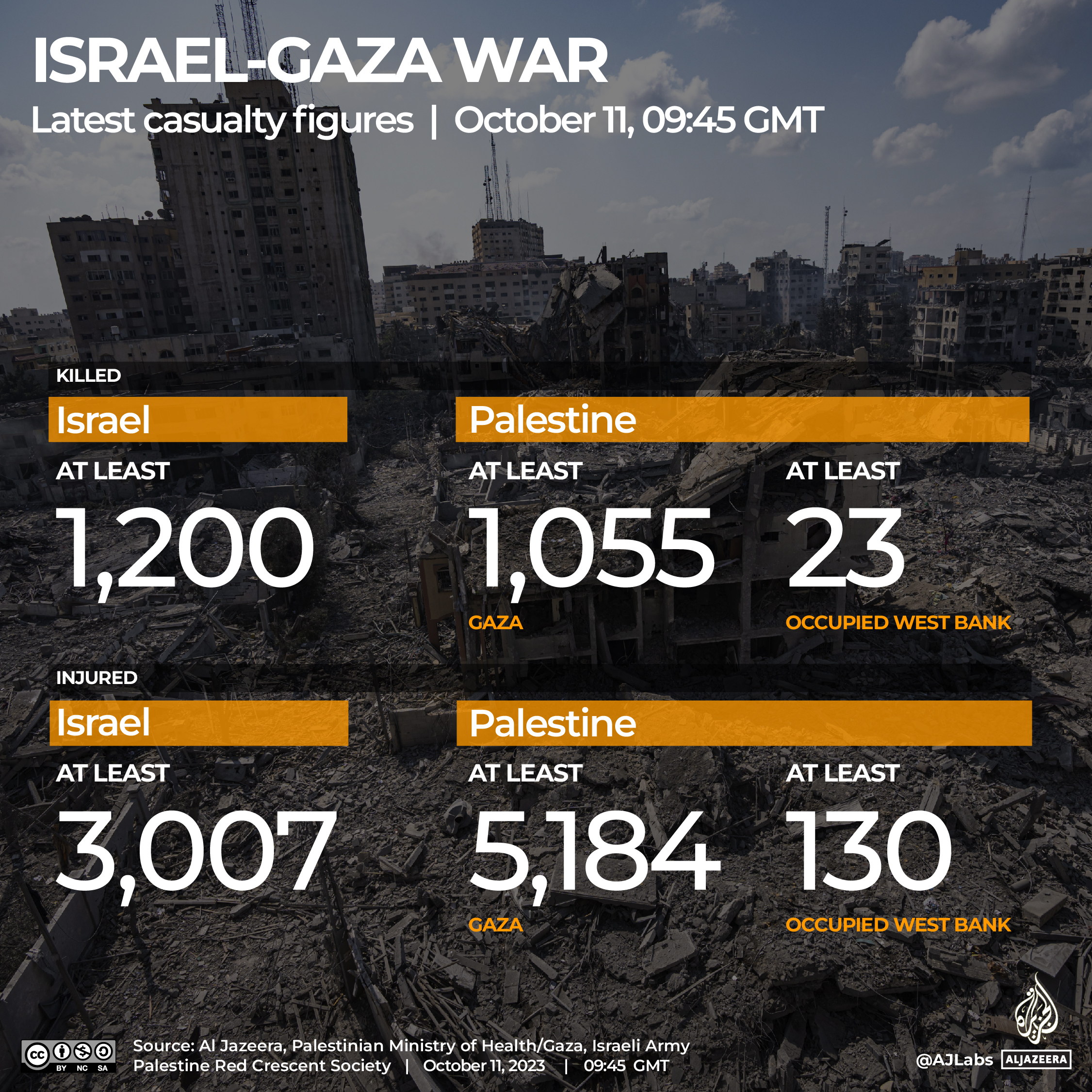
Brussels, Belgium – After Hamas’s unprecedented attacks in Israel, the Brandenburg Gate in Berlin, the Eiffel Tower in Paris and the Bulgarian parliament were among buildings across the European Union that were lit up in the white and blue of Israel’s flag.
In other demonstrations of solidarity, the European Commission and European Parliament hoisted Israeli flags outside their headquarters in Brussels.
On Wednesday, as part of a European Parliament vigil led by its president, Roberta Metsola, a minute’s silence was held to commemorate the Israeli victims and the country’s national anthem was played through speakers.
The Hamas assault on Saturday set off a major new war, with Israel now preparing a ground invasion of Gaza, having blockaded the besieged strip. More than 2,000 people on both sides have been reported killed since Saturday.
“This is a strong message against terrorism in Israel,” an Austrian tourist in Paris said of the Eiffel Tower display.
“So what if it is the EU stance on the conflict now?” said the woman, who requested anonymity.
But some said the gestures do not represent them.
“As a European citizen, I felt that my voice was erased through that action,” Elena, from Italy, told Al Jazeera.
“I was shocked. Especially when I saw [the Israeli flag] on the EU Parliament building. It’s the house of democratically elected representatives of Europe, many of whom do not simply ‘stand with Israel’.
“I was also shocked at how quickly the EU institutions put up the flags, I think it was even faster than Russia’s invasion of Ukraine. Considering the incredibly complex situation of Israel and Palestine, I think this rapid step is incredibly irresponsible.”

In the diplomatic corridors of Brussels, too, debates over the flag were heated.
One EU official, who requested anonymity, told Al Jazeera: “It makes me feel like I’m working for an organisation that is endorsing apartheid.
“Did the commission put the Palestinian flag up when the IDF shot teenagers in the ankles last week? Or when they killed journalist Shireen Abu Akleh? What Hamas is doing is terrible – but is it any different to what the IDF does every week?” the official said, referencing the May 2022 Israeli killing of Al Jazeera’s journalist, and recent reports that Israeli troops have been targeting young Palestinian protesters.
But, the bloc’s foreign policy chief’s spokesperson, Peter Stano, said that now is not the time to squabble over demonstrations of support, but rather focus on the grave situation in the Middle East.
“We are the only ones actively pursuing the restart of the peace process and are the biggest donor to the Palestinian people anyway,” he told Al Jazeera.
Diplomatic fallout
On Monday, as Israel retaliated to Hamas’s attacks by bombarding Gaza, EU Enlargement Commissioner Oliver Varhelyi said that the European Commission would suspend 691 million euros ($728m) in developmental aid to Palestine, sparking a brief diplomatic fallout.
The foreign ministers of EU nations such as Spain, Ireland, Belgium and Luxembourg criticised Varhelyi’s announcement, saying only the bloc’s foreign ministers can make such a decision.
“But where were the other countries, like Germany? Member states need to stand up against this rogue commissioner,” the EU official told Al Jazeera.
The EU has since back-pedalled, saying it won’t suspend the aid but rather review payments to ensure they are not misused. Even so, tensions remain.

“I find these suggestions to stop aid to Palestine very difficult to understand,” Sven Kuhn von Burgsdorff, the former EU ambassador to Palestine, told Al Jazeera.
“Hamas does not represent the people of Palestine. Why would we want to punish the people of Palestine? Also, all EU aid to the Palestinians is very thoroughly monitored. We scrutinise every single household member and bank account holder receiving aid and if any are linked to terrorists, he or she will not receive any aid. So I can 100 percent say that not a single cent goes to Hamas,” he said.
“Under the current arrangement, we deliver budgetary aid only to the Palestinian Authority, which sits in Ramallah, and don’t deliver anything to Gaza, with the exception of a social aid allowance package which benefits poor families in Gaza.”
European Parliament Member Evin Incir, a Swedish politician, told Al Jazeera that Varhelyi is well aware of how aid reaches Palestinians.
“He is trying to lie in the face of the European people and trying to connect the EU financial support to Hamas. It doesn’t go there. It goes through the Palestinian Authority,” she said.
The bloc’s foreign policy chief Josep Borrell said that “punishing all the Palestinian people” will “damage the EU’s interests in the region and embolden terrorists”.
After he met with EU foreign ministers on Tuesday, Borrell said: “The overwhelming majority of the member states considered that we have to continue our support to the Palestinian Authority and the payments due should not be delayed.”

The European Union officially says it is committed to the “vision of an independent and sovereign state of Palestine, living side by side with Israel in peace and security”.
But the bloc’s stance on all matters related to the Israel-Palestine conflict is complex and divisive.
“Some nations like Ireland have a recent history of colonialism, and so they’re particularly aware of the oppression of Palestinians,” the EU official told Al Jazeera.
Another EU diplomat, who also requested anonymity, said that amid the latest war, showing solidarity with the “Palestinian side … means you can also be accused of being anti-Israeli or even worse, anti-Semitic”.
“The fact that the European Commission and European Parliament [are] displaying the Israel flag appears to be a reflection of a general political preference for Israel, of these two institutions.”
The second diplomat noted, however, that the “European Council chose not to do so, mindful of the divisions between EU member states”.
Flying the flag at the European Parliament.
Solidarity with Israel 🇪🇺🇮🇱 pic.twitter.com/jnE8aGKlxl
— Roberta Metsola (@EP_President) October 8, 2023
In a recent briefing, a European Commission spokesperson told journalists that the body responds to “terror” attacks in the same way, regardless of where they occur, claiming its statements on Israel’s right to self-defence have nothing to do with its position on the Israel-Palestine conflict.
The spokesperson added that the commission is now focusing on matters “on the ground” and not “internal debates” within the bloc.
Meanwhile, according to emails seen by Al Jazeera, the European Parliament’s vigil on Wednesday raised concerns among some.
Members of the Parliament’s Left group questioned why sombre events were not previously held for Palestinian victims of Israeli occupation.
Incir, the centre-left Swedish politician, said she would prefer to see the Israeli and Palestinian flags hanging next to each other outside European institutions.
“That would have sent a clear signal from the European Union that the only way forward is a two-state solution, with two democratic states living in peace and security side by side,” she told Al Jazeera.
“The bombs are raining down on innocent people in Gaza. This is unacceptable and must also be condemned. It’s about the credibility of the European Union and its commitment to a two-state solution.”
How do Europeans want EU politicians to respond?
After meeting with the bloc’s foreign ministers, Borrell said that while Israel has the right to self-defence, its operations must be in line with international and humanitarian law, acknowledging that so far, “some of the decisions are contrary to international law”.
For Katie, from Ireland, the EU appears to be making a statement.
“The EU hasn’t really ‘picked a side’ before. But seeing the flags everywhere alongside their statements makes me feel like they have picked one,” she told Al Jazeera.
Nina, from the Netherlands, said while the Hamas attacks were “awful and wrong … we cannot forget the gradual acts of violence and war Israel has been conducting without any criticism”.
She said it seemed “hypocritical” to put up Israeli flags but not Palestinian flags “when they have been oppressed every day for decades”.
“Also Hamas is not the same as the PA and punishing all Palestinians for Hamas’s actions is very harmful and contributes to the already harmful European practices of looking away from Israel’s misconduct,” she added.
Marco from Belgium shared a similar view.
“In Palestine, like in Ukraine and Israel, innocent people are dying because for decades we have turned a blind eye to evil,” he said. “EU leaders should be able to condemn last week’s terrorist attack in Israel while also holding the Israeli government accountable for the criminal actions that have led up to this moment.”







